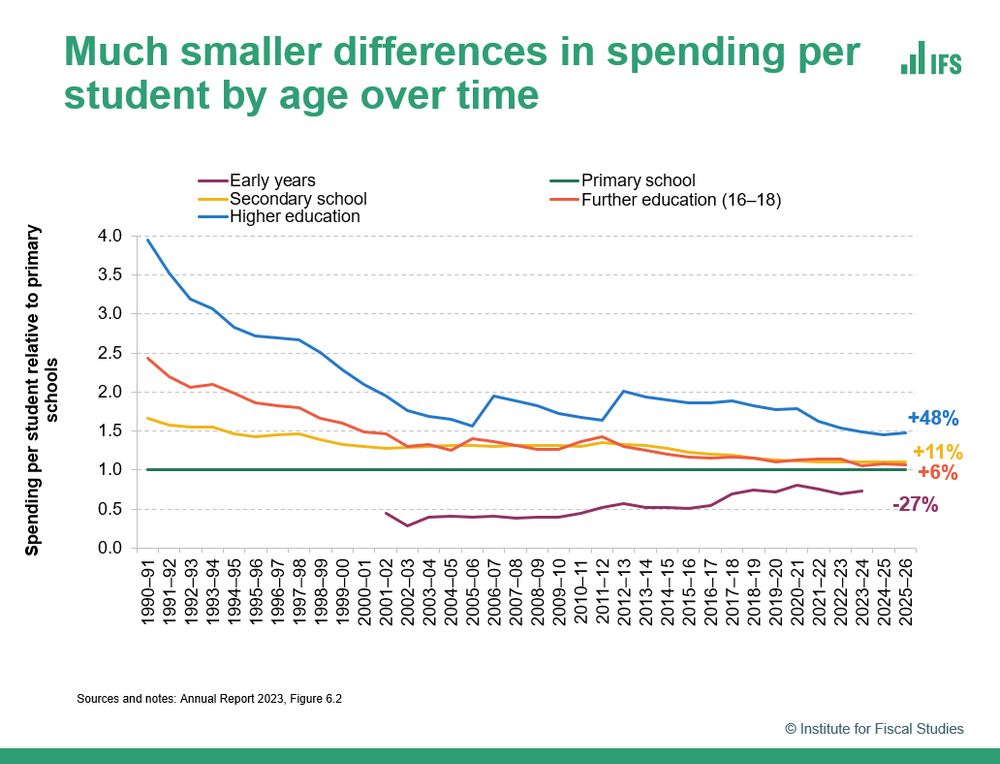
This is about £600m higher than previous forecasts quoted by the NAO
If delivered, current fiscal plans then imply real-terms cuts to mainstream school spending per pupil [1/3]

This is about £600m higher than previous forecasts quoted by the NAO
If delivered, current fiscal plans then imply real-terms cuts to mainstream school spending per pupil [1/3]
There are probably big differences within types of needs too, illustrating the diversity of need and challenge in providing support [6/6]


There are probably big differences within types of needs too, illustrating the diversity of need and challenge in providing support [6/6]
If this turns into more young adults on out of work benefits, this could generate big labour market and fiscal risks [5/6]

If this turns into more young adults on out of work benefits, this could generate big labour market and fiscal risks [5/6]
Many areas of London have high EHCP rates, but average CDLA claims
Some areas are really high on both measures (Knowsley: 7% with EHCPs, 16% on CDLA) [4/6]

Many areas of London have high EHCP rates, but average CDLA claims
Some areas are really high on both measures (Knowsley: 7% with EHCPs, 16% on CDLA) [4/6]


Spending is going to go up, the question is how to spend the money in ways that actually improve the system.

Spending is going to go up, the question is how to spend the money in ways that actually improve the system.



The net result is high cost and patchy quality [3/6]

The net result is high cost and patchy quality [3/6]
I hope you and I are never in that situation. But he faced this reality and wanted his voice heard why assisted dying should be legal in the UK
These are his words. He always wrote beautifully

I hope you and I are never in that situation. But he faced this reality and wanted his voice heard why assisted dying should be legal in the UK
These are his words. He always wrote beautifully
The 2025-26 baseline for the core schools budget is as specified in the Spring Statement and excludes the £600m for teacher pay from 2 weeks ago

The 2025-26 baseline for the core schools budget is as specified in the Spring Statement and excludes the £600m for teacher pay from 2 weeks ago

That would increase spending per pupil by about 3% compared with today, since pupil numbers are expected to fall [2/6]
ifs.org.uk/publications...

That would increase spending per pupil by about 3% compared with today, since pupil numbers are expected to fall [2/6]
ifs.org.uk/publications...
Builth to Cardiff via Devil's Staircase, Llyn Brianne, Black Mountain, Rhigos, Treorchy High Street (imagine it), passing through home towns of Max Boyce and Tom Jones, Caerphilly Mountain and a sprint finish at the bay

Builth to Cardiff via Devil's Staircase, Llyn Brianne, Black Mountain, Rhigos, Treorchy High Street (imagine it), passing through home towns of Max Boyce and Tom Jones, Caerphilly Mountain and a sprint finish at the bay

I wouldn't bet against a further narrowing
A planned £4bn increase to early years spending and likely cuts to other stages of education will probably already have this effect

I wouldn't bet against a further narrowing
A planned £4bn increase to early years spending and likely cuts to other stages of education will probably already have this effect
It shows a massive amount of information of how public spending priorities have changed over time

It shows a massive amount of information of how public spending priorities have changed over time
But its only a brief reprieve as universities face pressure from national insurance rises and falling international student numbers.
[6/6]

But its only a brief reprieve as universities face pressure from national insurance rises and falling international student numbers.
[6/6]
Freezing spending per student would cost £200m extra in 2027
Freezing spending in real-terms would lead to a further 4% cut over the next 2 years
[5/6]

Freezing spending per student would cost £200m extra in 2027
Freezing spending in real-terms would lead to a further 4% cut over the next 2 years
[5/6]
However, spending on special educational needs is forecast to rise by £2bn and is largely governed by legal duties. This wipes out most opportunities for savings
[4/6]

However, spending on special educational needs is forecast to rise by £2bn and is largely governed by legal duties. This wipes out most opportunities for savings
[4/6]
This largest ever boost will mainly have the effect of reducing childcare bills for working families
[3/6]

This largest ever boost will mainly have the effect of reducing childcare bills for working families
[3/6]
And recent increases in borrowing costs might be making this picture even more difficult
[2/6]

And recent increases in borrowing costs might be making this picture even more difficult
[2/6]



